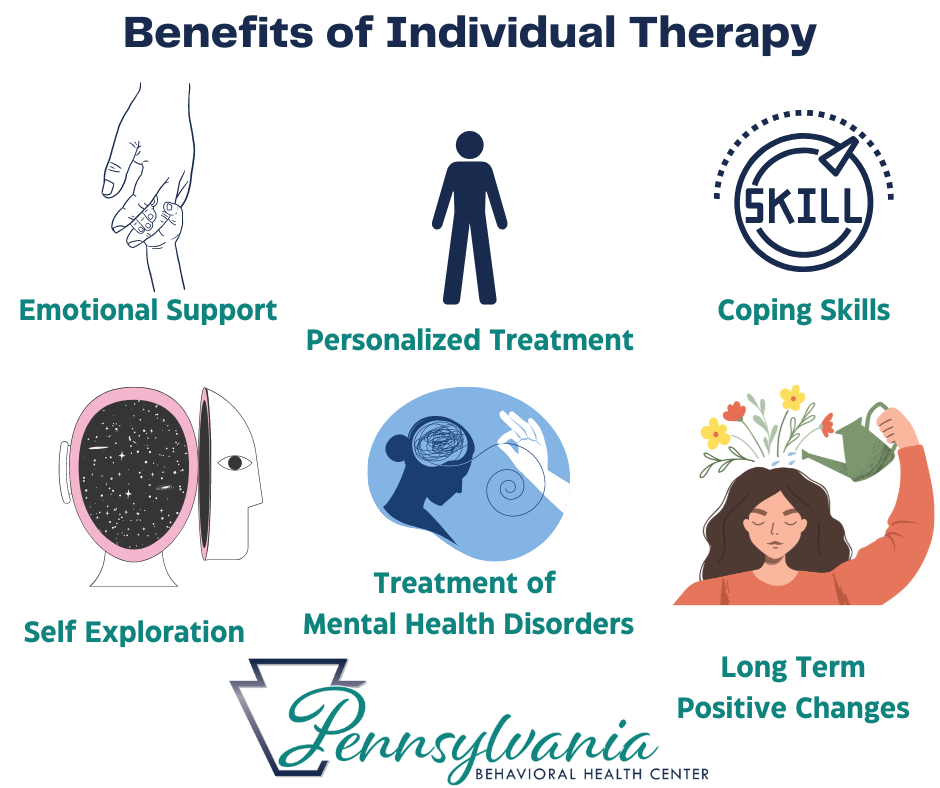What Does Mental Health Counseling Mean?
What Does Mental Health Counseling Mean?
Blog Article
Getting The Mental Health Counseling To Work
Table of ContentsThe Ultimate Guide To Mental Health CounselingFascination About Mental Health CounselingHow Mental Health Counseling can Save You Time, Stress, and Money.How Mental Health Counseling can Save You Time, Stress, and Money.Everything about Mental Health Counseling
Via treatment, you can get insight right into your own patterns of habits and communication, which can bring about even more meeting and satisfying partnerships with pals, family members, and charming partners. What we assume, we manifest. If you're consumed with negative emotions and adverse thoughts that are conflicting with your life, treatment can aid.Like our ideas, in some cases our habits become detrimental. They can keep us from living a positive and healthy and balanced way of living. Perhaps you fight with dependency, or you have a tendency to self-sabotage, or there are other unfavorable methods you act. Mental Health Counseling. Therapy can assist you change those habits that are having a negative effect on your world and relationships.

Obtaining therapy to resolve specific aspects of your life can aid you be much more efficient in various other locations, including work.

9 Easy Facts About Mental Health Counseling Described
There are also much more advantages of therapy than just the ones we have talked about., or construct relationships (charming or those with family or good friends) in a healthy method.
For the purpose of the existing research study, viewed advantages and barriers to mental health and wellness help-seeking are being explored. Previous study discovered that regarded barriers have a considerable impact on university student' health and wellness behavior options (Von Ah, Ebert, Ngamvitroj, Park & Kang, 2003). Perceived advantages and barriers to help-seeking were especially chosen due to their influence on decision-making and eventually action (Glanz, Rimer, & Su, 2005).
Today research seeks to check out whether or not preconception works as an obstacle to therapy among university pupils. Eisenberg et al. (2011) recommended that apprehension about treatment efficiency is one more barrier to taking part in treatment. Study searchings for disclosed that university student backed numerous obstacles to taking part in treatment. Mental Health Counseling. Among these were: (1) preferring to handle psychological illness themselves, (2) not having adequate time to join treatment, (3) questions regarding whether he has a good point psychological health therapy is reliable in remediating issues, (4) a belief that tension is regular or the issue will certainly improve without therapy, (5) lack of money, and (6) bother with what others would certainly think if they learnt about therapy engagement.
Staff in university mental health facilities may be regarded as unfriendly, and long wait times for solutions might be "repulsive" for pupils. Aspects helping with much more positive attitudes are usually at the opposite pole of those factors identified as obstacles.
Mental Health Counseling Fundamentals Explained
One in three (34.6%) reported living on campus and one in 4 (23.3%) reported coping with parents. Nearly fifty percent of students were associated with campus organizations and 1 in 10 reported remaining in a society or sorority. Even more than one-third of students (38.1%) reported that they had a relative or close friend with a diagnosed psychological health problem.
7 Simple Techniques For Mental Health Counseling
Univariate F-tests identified certain subscale products that significantly varied. Women were less most likely than men to perceive people that most likely to counseling as mentally weak, people that most likely to therapy as insane, to really feel that individuals with mental illness ought to deal with troubles on their very own, that people who go to counseling as unable to resolve issues, that people that most likely to therapy are lazy, and to feel that individuals who most likely to counseling are various from regular individuals in an unfavorable method.
In a similar way, study results revealed that females were significantly less likely than men to hold stigma-related mindsets. This follows previous research which likewise discovered that men hold higher levels of viewed stigma than females (Chandra & Minkovitz, 2006). Based upon research findings, it is obvious that men continue reading this may be much less likely than females to look for treatment due to reduced viewed barriers in addition to high stigma-related perspectives.
The Single Strategy To Use For Mental Health Counseling
In enhancement, university wellness professionals might offer educational explanation programs targeting men with info on the advantages of mental wellness treatment and the significance of looking for aid when needed., the existing research located no considerable differences in the number of viewed barriers to help-seeking behaviors based on sex.
Researchers speculate that this is primarily due to conventional social norms and sex functions that characterized males based upon toughness and absence of psychological expression (Addis & Mahalik, 2003; Ang, Lim, Tan, & Yau, 2004; Mojtabai, 2007). Overall, there have actually been mixed results among the university student population regarding sex distinctions (Rosenthal & Wilson, 2008). This searching for was unexpected and can highlight that those that had actually gotten counseling had a much better concept of wait times and various other "accessibility" barriers that might make it tough to begin therapy. Perhaps, participants who have obtained counseling view more barriers than participants who have not received therapy since seeking counseling services again can involve fear of self-disclosing individual details to a new therapist.
Report this page